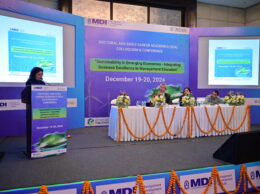CHENNAI : Indian Institute of Technology Madras (IIT Madras) Energy Consortium hosted an ‘Industry Day 2023’ in the campus today (30th June 2023) to chart a path towards decarbonizing Indian Economy. All the seven industry founding members – Shell, Baker Hughes, FLSmidth, Aditya Birla, Cummins, Chevron Tech Ventures and Infosys were in participation.
The Industry Day hosted a Workshop that deliberated on the two key areas of ‘Energy efficiency’ and ‘Carbon Trading.’
The workshop brought together different stakeholders to prepare strategic initiatives and lead towards specific projects around Energy efficiency and Carbon Trading. The workshops will focus on two sectors: the industrial/manufacturing sector and commercial buildings.
The Energy Conservation Act, 2001, was amended in December 2022 by the Indian Parliament. It set the ball rolling on the development and adoption of various measures that would focus on energy consumption, energy efficiency and carbon trading.
Cummins India, a leading manufacturer of engines and power generation equipment, is a founding member of the Energy Consortium.
Mr. Ajay Patil, CFO-Cummins India, elaborated “At Cummins, we are committed to making people’s lives better by powering a sustainable future. As a privileged partner and founding member of the esteemed IIT Madras Energy Consortium, we are excited to collaborate with industry peers and academia on strategic initiatives focused on decarbonization and sustainability. I am confident that our joint efforts, driven by research and innovation, will enable us to effectively address the challenges presented by Climate Change. Together, we will work toward our goal of powering a cleaner and greener future.”
The Key Outcomes from Industry Day 2023 include:
Ø Launch of the TREND Setter program to propel decarbonisation research.
Ø Opportunities for Indian MSMEs to decarbonise by EESL’s energy efficiency initiative and the Kotak-IITM Save Energy Mission (KISEM) network of assessment centres
Ø Building awareness on Carbon Trading and the emerging approaches
Elaborating on the key projects undertaken by The Energy Consortium and their impact, Prof. Satyanarayanan Seshadri, who is the head of the Energy Consortium and a Faculty in Department of Applied Mechanics, IIT Madras, “Meeting India’s net zero commitments require efforts at multiple level including core technology development, partnering with right institutions and industries for scale-up and setting the right directions.The ‘TREND Setter’ program launched during today’s (30th June 2023) industry day saw two major and five exploratory research projects supported. These span various topics from green ammonia to carbon capture to battery materials to sustainable aviation fuels. The Energy Consortium is supporting these projects in close collaboration with the founding members and look to deliver significant outcomes in 12 to 18 months.”
Energy efficiency is often considered the first fuel against climate change. It is also often the most neglected opportunity to decarbonise as the impact and outcomes are not immediately visible. There are also challenges in the perception of the magnitude of benefits. Thus, the impact of Energy efficiency so far in India has been much below its potential, with over 70 per cent of the recommendations provided by energy auditors being ignored, especially in the industrial sector.
Highlighting the opportunities that can emerge from decarbonising the Indian Economy, Dr. Nikhil Tambe, CEO – Energy Consortium, IIT Madras, added, “The Energy Consortium affiliated faculty are collaboratively advancing research in areas that are of national importance such as energy storage, carbon capture and utilization, sustainable aviation fuels, ammonia production and power electronics, with our seven industry founding members – Shell, Baker Hughes, FLSmidth, Aditya Birla Group, Cummins, Chevron and Infosys. This is an unprecedented effort of coordinated activities in energy grand challenge areas in India.”
The sessions focused on collecting views from industry (large and MSMEs), government regulators, financial institutions and banks, and energy auditors to determine key challenges and opportunities for driving up the implementation rates of the energy efficiency recommendations. Further, the session helped formulate recommendations that can be shared with agencies such as the Bureau of Energy Efficiency.
Carbon markets, where ‘carbon credits’ and ‘emission certificates’ can be traded, have acquired greater global currency. However, ‘carbon markets’ are a catch-all term and need clarity, especially in the Indian context.
A decade or more ago, they meant stock-market-like exchanges that traded in ‘carbon offsets’ made legitimate under the Clean Development Mechanism. This allowed industrial projects that avoided greenhouse gas emissions to be eligible for credits that could then further, after verification, be sold to companies wanting to reduce their own carbon footprints.
While India has maintained its right to grow its carbon emissions in the near future, it has committed to cutting the emissions intensity by 45% (of 2005 levels) by 2030. It has been doing this, partly, via the Perform, Achieve and Trade (PAT) scheme, where around 1,000 industries have been involved in procuring and trading energy saving certificates (ESCerts).









